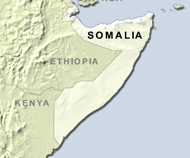VOA标准英语10月-Concern Grows for Journalists Kidnapped in Somali(在线收听)
 Amanda Lindhout and Nigel Brennan, freelance journalists from Canada and Australia, respectively, were abducted west of the Somali capital Mogadishu on August 23, along with Abdifatah Mohammed Elmi, a Somali journalist who was accompanying them.
Amanda Lindhout and Nigel Brennan, freelance journalists from Canada and Australia, respectively, were abducted west of the Somali capital Mogadishu on August 23, along with Abdifatah Mohammed Elmi, a Somali journalist who was accompanying them.In early September, the kidnappers demanded a ransom of $2.5 million. Since then, there has been no official communication with the kidnappers.
Later in September, the foreign journalists were shown in a video broadcast on al-Jazeera television. The station reported that a group calling itself the Mujahideen of Somalia claimed to be holding them, and criticized Canadian and Australian involvement in the conflict in Somalia.
But there has been little other indication of a political motive. The French-based organization Reporters Without Borders questioned whether the video was produced by the kidnappers themselves.
The Secretary General of the National Union of Somali Journalists, Omar Faruk, says the kidnappers appear to simply be after money.
"As far as we know, the kidnappers are freelance militias, and they have demanded a ransom," Faruk said. "They are not part of the warring sides. That is something that we have never seen. Journalists to be kidnapped and that huge amount of money demanded."
He urged Somali politicians not to get involved in the issue, warning that their statements could complicate the efforts of clan elders, who he said have the ability to secure the journalists' release.
Reporters Without Borders has called Somalia the most dangerous country for journalists in Africa. Nine Somali journalists have been killed so far this year . Faruk says they are threatened both by insurgent and government forces.
"Journalists are not going to the field to cover the news. Because of safety reasons," Faruk explained. "There are many roadblocks in Mogadishu city. Journalists cannot walk, and if they walk having a microphone or digital camera they will be seen by the militias as spies or as enemies and they will be targeted. And they do not want to risk their lives. So quality journalism is dead in Somalia, particularly in Mogadishu, there is widespread censorship, threats are constant."
Fighting continues in Mogadishu, with Islamist insurgents firing on African Union peacekeepers. Additional peacekeepers have arrived from Burundi in recent days, but the current force of around 3,000 Ugandan and Burundian troops is far less than the envisioned 8,000.
The mission has had little success in controlling the conflict between Islamist insurgents and the Ethiopian-backed transitional government. The African Union has asked for the United Nations to take over responsibility for peacekeeping in Somalia, but there has been little indication the United Nations would be interested in doing so.